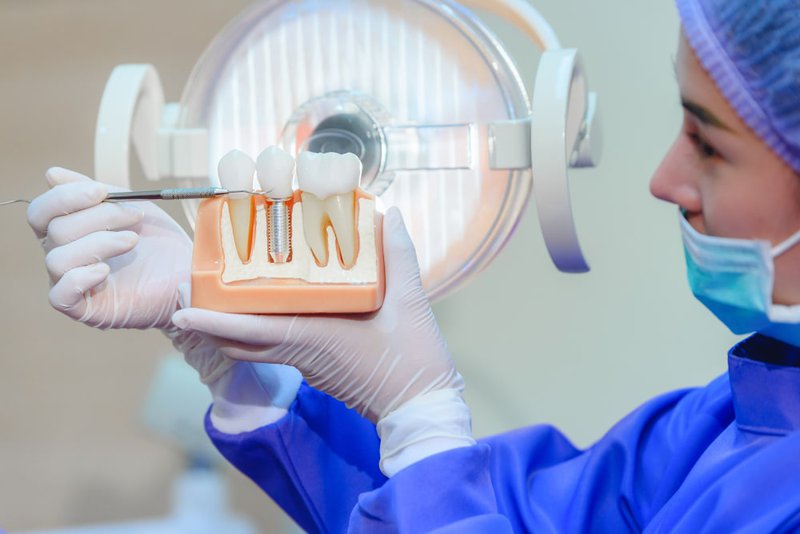
How Dental Implants Improve Oral Health Beyond Aesthetics
Although they are usually connected with enhancing the appearance of a smile, dental implants have advantages well beyond only cosmetic ones. Dental implant treatment offers essential enhancements to general oral wellness, so preserving jawbones, improving biting function, and safeguarding of nearby teeth. This essay will go over how dental implants offer long-term health advantages and provide necessary information on dental implants that transcends only cosmetic value. Knowing the whole range of advantages will enable you to decide on teeth replacement surgery more wisely.
Key Takeaways
- Dental implants stimulate the jawbone, therefore preventing bone degradation.
- Correct biting function restored by implants helps to avoid more dental problems.
- Maintaining alignment and lowering the risk of infection helps them to protect nearby teeth.
- Their long-term durability distinguishes them from alternative replacement choices.
Jawbone Preservation
The Problem with Missing Teeth
One of the less well-known problems resulting from missing teeth is degradation of the jawbone. When a tooth is gone, the bone under it loses stimulation from chewing among other things. This can cause the bone to shrink or resorber over time, which would cause more problems including facial drooping and trouble eating.
How Implants Help
Dental implants are made to resemble natural teeth in root structure as well. Usually using a titanium post placed into the jawbone, a dental implant system generates the same type of stimulation as a natural tooth root. This enables your face to stay structurally intact and stops bone loss. Define a dental implant. This is basically a tooth replacement choice that keeps the jawbone strong and functional by merging with it. This feature of permanent dental implants guarantees long-term oral health by helping the jaw to remain in shape and condition.
Restoring Proper Bite Function
Impact of Missing Teeth on Bite
Apart from affecting the appearance of your smile, missing teeth can cause biting problems and misalignment. Losing a tooth could cause the neighboring teeth to start to move into the void and produce an uneven bite. This posture can be uncomfortable and even result in illnesses including temporomandibular joint (TMJ). Moreover, an uneven bite could put too much strain on some teeth, which causes wear and tear, cracking, or other damage.
How Implants Restore Functionality
Dental implants are meant to bring your bite back to its whole capacity. Dental implant treatment replaces lost teeth so that the remaining teeth do not migrate and therefore preserve a good bite. Unlike teeth, which could slip or move when eating, implants remain firmly in place and let for more natural biting and chewing motions. This stability guarantees long-term comfort and functionality by improving digestion generally and so lessening the burden on other teeth.

Protection of Surrounding Teeth
The Domino Effect of Tooth Loss
The rest of your teeth may fall out line depending on tooth loss. Neighbouring teeth will probably move toward the empty space in your mouth. Because crooked teeth are harder to clean and raise the risk of decay or gum disease, this misalignment can cause more dental problems including trouble maintaining oral hygiene.
How Implants Maintain Alignment
Dental implants support correct alignment of adjacent teeth by occupying the void left by a missing tooth. This lowers the possibility of more misalignment and stops the cascading effect following tooth loss. Because they are firmly anchored into the jawbone, implants resemble natural teeth in supporting adjacent teeth and maintaining the general dental integrity.
Gum Health and Reduced Risk of Infection
Gaps and Gum Problems
A lost tooth's void left behind can readily become a bacterial trap. As food particles and plaque gather in these areas, gum disease or infections become more likely. Gum disease can worsen the jawbone if left untreated, therefore complicating future dental procedures and general oral health.
How Implants Help
Dental implants cover the void left by lost teeth, greatly lowering the likelihood of bacterial growth and infection. Long term, this implies improved gum health. Besides knowing what is a dental implant, it is also important to understand another thing. How do dental implants work? Once the implant is in place, it functions as a fully working tooth, supporting the surrounding gum tissue and keeping damaging material out of areas where it can create issues. Maintaining a good gum line, dental implants support long-term oral hygiene and help lower the risk of periodontal disease.

Long-Term Durability and Stability
Longevity of Implants
Longevity of dental implants is one of their main benefits. Dental implants are made to last a lifetime with appropriate maintenance unlike some other tooth replacement choices like bridges or dentures. Made from robust materials like titanium, which merges with the jawbone in a technique known as osseointegration, they offer a secure and permanent fix.
Comparing Implants to Other Options
Compared to dentures, dental implants provide unmatched stability; with time, these may require replacements or adjustments. While some people find bridges to be a suitable fix, over time they can degrade depending on the support from surrounding teeth. Are dental implants safe? Indeed, implants are a safe and quite successful long-term remedy for missing teeth when carried out by qualified experts. Known for their strength and dependability, they demand little care beyond basic oral hygiene habits.
"Dental implants not only improve the look of your smile but also are rather important for preserving oral health. Implants provide a complete answer to the issues resulting from missing teeth by stopping bone loss, guaranteeing appropriate bite alignment, and shielding surrounding teeth. Long-term investments in both look and function let patients eat, talk, and live more confidently. — Dr. Jerry Jesin, DDS.
Dental Implants at North York Smile Centre
At North York Smile Centre, we know that dental implants are an investment in your oral health rather than only a cosmetic one. Our dental implant systems are meant to produce visually attractive, robust, and useful results. We provide a choice of dental implant treatments catered to your particular requirement whether your need is for a full arch restoration or a single missing tooth solution.
We would be happy to arrange a consultation with our team of experts if you are ready to investigate how dental implants might enhance your oral health and quality of life. Learn the advantages of permanent dental implants and start toward a smile restoration.
FAQs: Common Questions About Dental Implants
1. What is a dental implant?
A dental implant is a permanent tooth replacement option that involves a titanium post being surgically placed into the jawbone to act as an artificial tooth root. A crown is then attached to the post, replicating the look and function of a natural tooth.
2. Are dental implants safe?
Yes, dental implants are a safe and effective solution for replacing missing teeth when performed by a qualified dental professional. They have a high success rate and, with proper care, can last a lifetime. Additionally, materials used, such as titanium, are biocompatible and integrate well with the jawbone.
3. How do dental implants work?
Dental implants work by mimicking the structure of a natural tooth. The titanium implant post fuses with the jawbone over time, providing a stable foundation for the attached crown. This fusion process, called osseointegration, ensures that the implant becomes a permanent part of your mouth, allowing you to chew and speak with confidence.
4. Is the dental implant treatment painful?
The dental implant procedure is usually performed under local anesthesia, ensuring minimal discomfort during surgery. After the procedure, patients may experience some mild soreness or swelling, which can be managed with pain relievers. Most patients find the process to be less painful than expected, and the long-term benefits far outweigh any temporary discomfort.
5. What are the benefits of dental implants compared to other teeth replacement surgery options?
Dental implants offer several benefits over dentures and bridges, including improved stability, durability, and the preservation of jawbone health. Unlike dentures, implants don’t slip, and they don’t rely on neighboring teeth for support, as bridges do. This makes implants the most natural and long-lasting option for tooth replacement.
6. How long do dental implants last?
With proper care, permanent dental implants can last a lifetime. Good oral hygiene, including regular brushing, flossing, and dental checkups, is essential to maintaining the longevity of the implants.
7. What should I consider before choosing dental implants?
Before opting for dental implants, consider factors such as your overall health, jawbone density, and commitment to oral hygiene. It’s essential to consult with your dentist to determine whether you’re a good candidate for the procedure. Additionally, understanding the long-term commitment involved in maintaining your dental health is crucial for ensuring the success of your implants.

